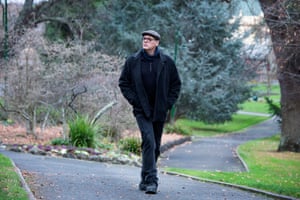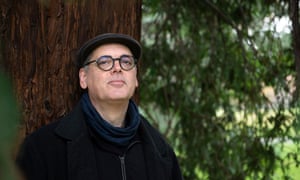Money alone won’t make you happy but a lack of it has negative consequences, including a sense of disconnection
Name: David Samuel*
Age: 54
Lives: Launceston, Tasmania
Turning point: 2008 global financial crisis, when my job was offshored
After housing costs has to live on: $170 a week
I am a Caucasian heterosexual male in my mid-50s. According to some, I should feel privileged and enjoy various entitlements. Instead, I have something in common with many thousands of other Australians who are reliant on welfare payments – a sense of disconnection from mainstream society.
I live below the poverty line. I have not had full-time employment for over a decade. I struggle some days, mentally and financially; with a loss of identity and with social situations. Anxiety–induced hypertension and other increasingly common societal ills – depression, despair, loneliness and social isolation – loom large, shadowing me.
Exiled to the periphery of society, it is easier to not want to be connected. Who’ll miss me if I choose to disconnect from the political mayhem, the foreign policy flare-ups, the general misery and pain that humans inflict on each other? I am genuinely concerned at the damage humans do to the planet, including exploitation of animals and poisoning the air and water for short-term profits. Who really wants to be a paying passenger on that slow-motion train wreck? I’ll get out and walk.
How should we consider those who are living a solitary existence? How do sensitive, often wounded and alienated souls find a place of belonging and peace in this world when surrounded by various tribes that are cruel, uncaring, ignorant and greedy?
Some decisions I make disconnect me from social interaction. It is now being recognised that social contact, face-to-face networks and community participation creates happier and healthier people who live longer and contribute more to society.
"It’s easy to feel the anxiety start rising when you think about the major decisions to make as you get older"
And while money alone will never make you happy, a lack of it does have negative consequences. I have a total of $170 a week for everything – yes, everything for a week, about $24 a day – after rent is paid. I must prioritise health, food, bills and oftentimes it is simply “no”. So I miss out on participating – I become disconnected from support networks and social activity. A $240 medical or utility bill consumes 10 days of my budget.
With no savings for a deposit and legal fees necessary to buy a house, I am trapped in the rental housing market, always subject to uncertainty. I have been in Tasmania about six years and have lived in four different places, having to move each time for no reason that I had any control over.
Rent, bond and moving expenses are always a big cost. Acceptable housing is scarce, expensive and always a compromise. There are thousands ahead of me on the waiting list for affordable or social housing.

Age: 54
Lives: Launceston, Tasmania
Turning point: 2008 global financial crisis, when my job was offshored
After housing costs has to live on: $170 a week
I am a Caucasian heterosexual male in my mid-50s. According to some, I should feel privileged and enjoy various entitlements. Instead, I have something in common with many thousands of other Australians who are reliant on welfare payments – a sense of disconnection from mainstream society.
I live below the poverty line. I have not had full-time employment for over a decade. I struggle some days, mentally and financially; with a loss of identity and with social situations. Anxiety–induced hypertension and other increasingly common societal ills – depression, despair, loneliness and social isolation – loom large, shadowing me.
Exiled to the periphery of society, it is easier to not want to be connected. Who’ll miss me if I choose to disconnect from the political mayhem, the foreign policy flare-ups, the general misery and pain that humans inflict on each other? I am genuinely concerned at the damage humans do to the planet, including exploitation of animals and poisoning the air and water for short-term profits. Who really wants to be a paying passenger on that slow-motion train wreck? I’ll get out and walk.
How should we consider those who are living a solitary existence? How do sensitive, often wounded and alienated souls find a place of belonging and peace in this world when surrounded by various tribes that are cruel, uncaring, ignorant and greedy?
Some decisions I make disconnect me from social interaction. It is now being recognised that social contact, face-to-face networks and community participation creates happier and healthier people who live longer and contribute more to society.
"It’s easy to feel the anxiety start rising when you think about the major decisions to make as you get older"
And while money alone will never make you happy, a lack of it does have negative consequences. I have a total of $170 a week for everything – yes, everything for a week, about $24 a day – after rent is paid. I must prioritise health, food, bills and oftentimes it is simply “no”. So I miss out on participating – I become disconnected from support networks and social activity. A $240 medical or utility bill consumes 10 days of my budget.
With no savings for a deposit and legal fees necessary to buy a house, I am trapped in the rental housing market, always subject to uncertainty. I have been in Tasmania about six years and have lived in four different places, having to move each time for no reason that I had any control over.
Rent, bond and moving expenses are always a big cost. Acceptable housing is scarce, expensive and always a compromise. There are thousands ahead of me on the waiting list for affordable or social housing.

When I was widowed nearly 20 years ago, I chose to become a full-time single father – I had to make some hard financial and professional choices. Many years of contracting, then “home duties” and a decade on welfare means I have virtually no superannuation saved. I will have little to enjoy retirement with if my situation does not improve. Centrelink is not putting away an extra 17.5% of my Newstart payment for those rainy, uncertain days ahead.
Savings eventually disappear, assets get sold and disasters strike, taking PTSD-esque chunks out of your nest egg (and soul). If you have no spare capacity, something always gets sacrificed. Debts to family and friends go unresolved, always weighing on your mind.
"Poverty does not have to be a hindrance to finding happiness and purpose"
It’s easy to feel the anxiety start rising when you think about the more frequent or major decisions to make as you get older. What standard of care will I get, what waiting (to die) list will I be on if the current policies and programs for aged care and pensions get worse?
It is important to do what you can for the most important person in your life – you. Invest the time in your self-care. Meditate, exercise, read books, play music, spend twice as many hours outside than you do on social networks. Relabel and reassess other sources of stress in your life. Forgive, forget, forge ahead anyway. Connect with yourself – it is the foundation for your future. Then you find more meaningful connections with others. The only person you can truly make happy is yourself. Remain connected to life on your terms.
While I may be subject to the daily anxieties and stress of living on the breadline, I have, by connecting back to myself, found that the best things for me in life are free. They do not even cost time; rather, that time is an investment in myself. By prioritising my health and mental welfare, I stay connected to my potential. Air and water, sunshine and dreams – still free and vital to life.
Continual learning and personal enrichment, diet, exercise and other physical and spiritual practices create the foundation for health and wellbeing on any budget. Poverty does not have to be a hindrance to finding happiness and purpose. It is easy to walk or cycle. Our smiles and manners acknowledge others. Eat less, move more. Stand up and breathe deeply. Swim.
I am grateful for what I do have, and thankful my situation is manageable enough – that I am not in physical pain, or with full-time caring duties, or trying to deal with serious mental health issues, addiction or homelessness (especially in a Tassie winter). I keep my head above water. I have found my own solution to not feeling too disconnected, to living a life with some meaning, dignity and future possibilities.
* Name has been changed
• Comments are premoderated to ensure the discussion is about topic addressed in this article

No comments:
Post a Comment